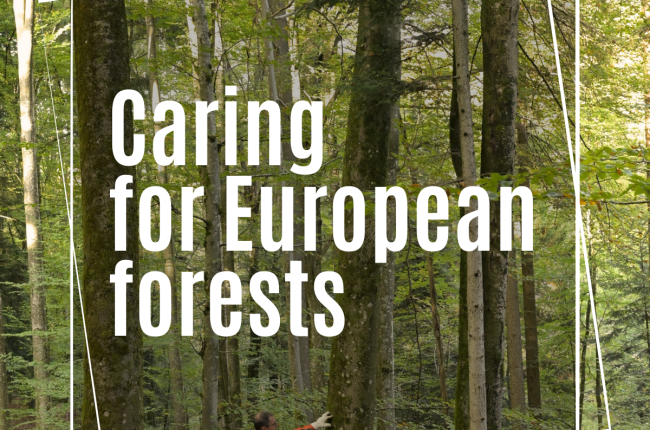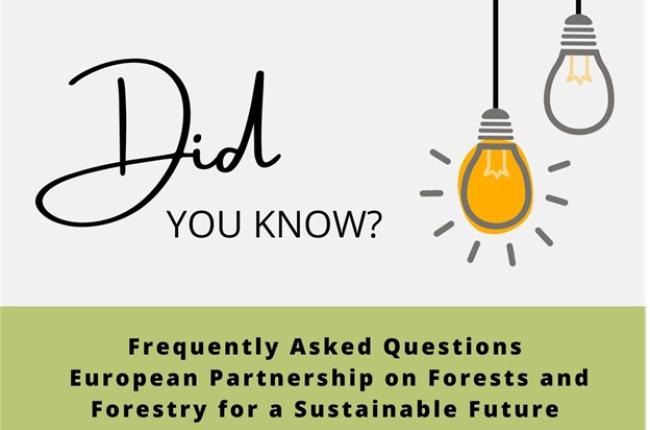WoodBeBetter: Nature restoration in forests
On 15 October, the WoodBeBetter network, representing Swedish Forest Owners and Swedish Forest Industries, organised an event hosted by MEP Emma Wiesner to discuss forest restoration globally and in the EU.
The event provided a good opportunity to discuss the upcoming proposal of the European Commission for a legally-binding EU instrument on nature restoration. All ecosystems in the EU would be addressed by such an instrument and specific targets on forest restoration are being considered.

After an introduction to the objectives and main features of the proposal by Humberto Delgado Rosa, Director in DG Environment, two presentations from practice were given by Mette Kahlin McVeigh, Senior Vice President of Stora Enso, and Sven Erik Hammar, President of CEPF.
The three panellists then exchanged on the specific aspect of this future proposal on European forest, their owners and the forest-based value chain. On behalf of European Forest Owners, Mr Hammar stressed in his concluding remarks that “For a policy to be successful, it should have support from those who are responsible for implementing it and bearing the risks and costs of this implementation”.
The recording of the event is available here.
Nature Directors Meeting in Slovenia
The Slovenian Presidency of the Council of the EU hosted on 17-19 November its meeting of EU Nature and Biodiversity Directors in Portorož. The event provided an opportunity to discuss on-going policies in the field of biodiversity, in particular on the EU Biodiversity Strategy for 2030 and related governance, the EU Forest Strategy for 2030, and Wild pollinators.
CEPF was represented at the meeting by Hélène Koch, CEPF Policy Advisor, who also presented the views of the Natura 2000 Users Forum on the implementation of the EU Biodiversity Strategy for 2030.

According to the Natura 2000 Users Forum, there are three essential keys to a successful implementation. First, the work done by land owners, managers and users to preserve, promote and provide biodiversity by their activities has to be recognised. Second, this work needs to be adequately financed as land owners, managers and users invest in nature, often without any financial support. Third, the practical knowledge of and experience of land owners, managers and users of how best to work for nature must be better acknowledged.
In her presentation, Ms. Koch used a video of the #WelcomeToMyForest campaign as an illustrative example of how essential and mutually beneficial it is to building on practical know how.
The new EU Forest Strategy discussed at the Paper & Beyond Conference
The annual Paper & Beyond event by Cepi took place on 17 – 18 November 2021 and brought together speakers and participants from the pulp and paper industry value chain. CEPF Secretary General, Fanny-Pomme Langue, participated to the session “The new European forest strategy – smart for European forestry?” as one of the speakers.

Ms. Langue presented European forest owners’ views on the EU Forest Strategy for 2030. The Strategy was awaited and supported by forest owners. However, the outcome raises high concerns among forest owners among which the lack of acknowledgement forest owners’ work done so far, the unbalanced approach focusing mainly on the environmental aspect, and the simplistic one-size-fits-all approach towards forest management, stated Ms. Langue. Regarding the implementation of the Strategy, forest owners call the Commission for a real involvement in the process.
After the opening statements, the speakers engaged in a panel debate on a new criteria, thresholds and ranges of sustainable forest management (SFM), forest monitoring, and the role of bioeconomy in the new Strategy.
From forest owners’ perspective new SFM criteria defined at EU level are questionable given the existing criteria defined within Forest Europe and the planned work related to these criteria under this pan European process. Since the EU is signatory to Forest Europe, forest owners are wondering why the Commission intends to do this work separately, explained Ms. Langue.
Regarding forest monitoring as announced in the Strategy, the national systems and data already available should be used and the costs and administrative work should be properly addressed.
In terms of the bioeconomy, the forest strategy is addressing it more from a perspective of risk than opportunity which is problematic given the important role that wood-based products play in reaching the carbon neutrality goal. By not putting similar weight on short-lived wood products, the Strategy misses the point that it is not possible to develop the use of long-lived wood products e.g. in construction and not to develop the other uses.
For more information about the event, visit here.
More about European forest owners’ and managers views on the Forest Strategy for 2030, can be read here.
CEPF Presented on Forest Certification at an Event by FSC
CEPF was invited to present on 10 December 2021 at the Iberian Event organized by Portuguese and Spanish FSC, under the theme “Group Forestry Certification – the importance of small forest owners and communities under FSC system”. CEPF Vice-President, António Paula Soares, gave a presentation about forest certification as a tool in EU forest-related policies.

Mr. Soares presented the analysis of the current situation of EU forest-related policies that refer to forest certification as a tool as well as forest owners’ concerns and doubts.
In particular, forest certification is referred to in three recent Commission proposals, namely the EU Forest Strategy, the proposal to revise the Renewable Energy Directive, and the Deforestation Regulation. In these initiatives, CEPF has identified two main ways in which forest certification is incorporated. The first way is the proposal of EU-own certification schemes, such as the EU voluntary closer-to-nature forests management certification scheme put forward in the EU Forest Strategy. The second way is used both in the Renewable Energy Directive and the Deforestation Regulation. In these proposals, the Commission foresees that certification can be used to demonstrate to a certain extent the compliance with legislative requirements.
All in all, forest owners still have several open questions, for example on the need of an EU voluntary closer-to-nature forest management certification scheme and its interaction with existing schemes. Also, the degree in which certification can be used as a proof of compliance to EU forest-related legislation still needs further clarification.
Information about the event is available in Portuguese here.




